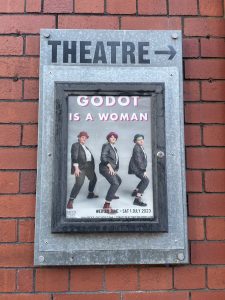‘Godot is a Woman’ is a play that has received multiple five-star raving reviews and critical acclaim. Genevieve Bland went to review a recent performance at Bristol’s Tobacco Factory.

“I Was Busy Thinking About Boys” blasts out as actors, armed with fake moustaches and heavily inflated groins, confidently dance in traditionally masculine ways and swag to this modern hit. This moment encapsulates the comedy of gestures that will keep you giddy and giggling.
Dressed as old vagabonds, reminiscent of Charlie Chaplin’s iconic clownish attire, Josie, Cordelia, and Jack will bring you on a captivating journey exploring why women can’t play Samuel Beckett’s play ‘Waiting for Godot’.
In a minimalist set, we are introduced to the three actors as they wait in line at an old phone booth. For the first 10 minutes, the actors barely speak, instead using gestures and expressions to create great comic relief, evoking the manoeuvres of old silent films.
The phone booth skit is disrupted by the apparition of a book, hovering down as if fallen from the sky, with music and lights giving the impression of divine intervention. The comedians struggle to grab the book, ‘Waiting for Godot’ by Samuel Beckett.
This is followed by a dynamic explanation of how Beckett revolutionised theatre in the mid-20th century. We are informed that the Beckett estate has, and will, prosecute any female cast production for this specific play. Several court cases are mentioned, all lost by the defendants, as it is claimed a female cast would deform the play.

 Following this report, the women sit down and wait. A seemingly dull moment actually encapsulates the play’s message: women are waiting to be picked, to be allowed to play.
Following this report, the women sit down and wait. A seemingly dull moment actually encapsulates the play’s message: women are waiting to be picked, to be allowed to play.
Later, a trial occurs, in which the comedians elaborate on the sexist reasons for banning women from the play. It includes a chilling moment where a blue light is shone on one of the actresses, reminding us of how Beckett reduced women to their bodies, often writing female characters as “wife” or “mistress”.
This pastiche of ‘Waiting for Godot’ asks why the Samuel Beckett Estate vehemently opposes female casts from this play when the stage writer was known to have revolutionised theatre. Wouldn’t women be walking in his trailblazing footsteps by doing this play? It also touches upon modern questions such as: where do non-binary people stand in this ban?
The prowess of this play lies in the superb comedy intertwined with serious and philosophical questioning, a clever way to mirror Beckett’s play, which we come to understand is an allegory of humankind.
‘Godot is a woman’ is a manifesto making the argument that females ‘simply not fitting the casting’ is a metaphor for Beckett’s apparent belief that only men are deemed able to represent humanity.

